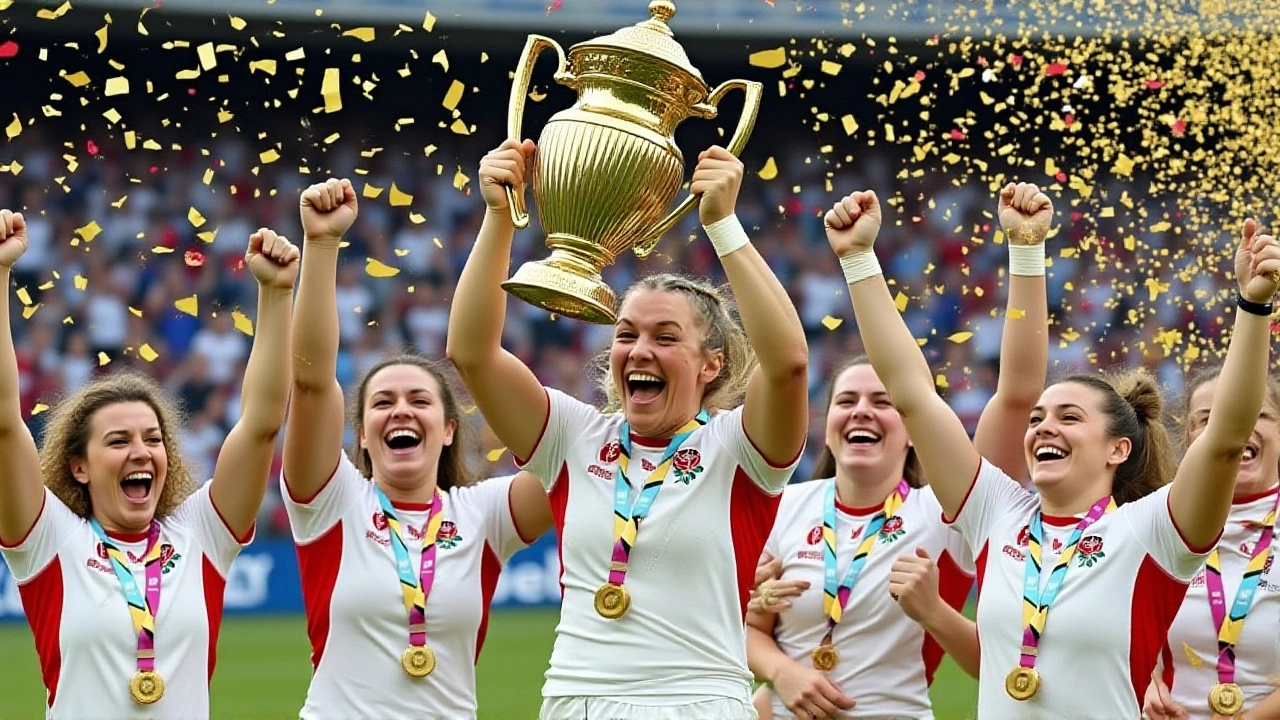England’s Red Roses didn’t just win the Women's Rugby World Cup 2025Allianz Stadium — they redefined it. With a commanding 33-13 win over Canada on Saturday, September 27, 2025, in front of a record-breaking crowd of 81,885 at Twickenham, London, the team claimed their third world title in history. The victory wasn’t just about points. It was about legacy. For the first time since 2014, England lifted the trophy on home soil, and this time, they did it with a ruthlessness that left even their fiercest rivals speechless.
A Nation Holds Its Breath — Then Roars
It began with a shock. Just five minutes in, Asia Hogan-Rochester of Canada darted through England’s defensive line for the opening try. The Canadian bench erupted. The home crowd fell silent. For a moment, it felt like déjà vu — the 2014 final replayed in real time, with Canada again striking first. But this England side wasn’t the same team from a decade ago. They’d spent seven years building for this moment.
By the 26th minute, the tide had turned completely. Ellie Kildunne responded with a blistering 8-minute try, followed by Amy Cokayne’s powerful drive over the line and Alex Matthews’s second try in as many minutes. Fly-half Zoe Harrison slotted every conversion. At halftime, England led 21-8. The crowd wasn’t just loud anymore — they were vibrating. You could feel it in your chest.
Second Half: A Masterclass in Control
Canada came out firing. Captain Sophie de Goede kicked a penalty in the 34th minute, narrowing the gap to 21-11. It felt like a lifeline. But England’s defense — disciplined, relentless, engineered over years — didn’t crack. Not even when Flo Simons, playing with a strapped knee, battled through tackles like a warrior.
Then came the dagger. In the 50th minute, lock Abbie Ward — England’s captain and the beating heart of their scrum — powered over from close range. Harrison converted. 28-11. Then, with just 11 minutes left, Alex Matthews did it again. A surging run from the back of a ruck, a fend, and a dive. 33-11. The stadium had become a sea of red. The final whistle was a release of seven years of pressure.
Canada’s Asia Hogan-Rochester added a late consolation try, but it was too little, too late. The scoreboard didn’t lie: England had dominated possession, won 92% of their scrums, and forced six turnovers in the second half. Their set-piece precision wasn’t just good — it was historic.

Who Made the Difference?
Sadia Kabaya was named Player of the Match by ESPN, but the truth is, this win had no single hero. It was a symphony. Jess Breach’s line breaks. Alex Matthews’s dual tries — her fourth World Cup final, her third try in the tournament. And then there was Abbie Ward, lifting the trophy with tears in her eyes. She’d been in the 2017 final loss. She’d played through injuries in 2021. Now, she was captain of the champions.
Canada, meanwhile, had earned every ounce of respect. Their semifinal win over defending champions New Zealand — 34-19 in Bristol — was one of the most shocking results in women’s rugby history. Yet England’s physicality, their tactical discipline, their depth — it all proved too much. As Rugby Canada put it in their post-match statement: "While England lifted their third world title, Canada captured silver and earned something equally enduring: the admiration of Canadians from coast to coast."
What This Means for Women’s Rugby
The 81,885 attendance shattered the previous Women’s Rugby World Cup record — by over 10,000. Ticket sales had sold out weeks in advance. Broadcast viewership across the UK and North America hit record highs. Social media exploded. The hashtag #RedRosesRising trended globally. This wasn’t just a match. It was a cultural moment.
England’s dominance since 2014 has been quiet but absolute. They’ve won every tournament they’ve entered since their last title — including the 2022 Six Nations Grand Slam and the 2023 World Series. This wasn’t a fluke. It was the culmination of sustained investment, professional contracts for players, and coaching continuity. The Rugby Football Union has already signaled plans to increase funding for grassroots women’s programs, especially in regions like Yorkshire and the North West, where talent has long been overlooked.
For Canada, the future is bright but demanding. With three players returning from the 2014 final — including Flo Simons — they now have a core that knows what it takes to reach the summit. The question isn’t whether they’ll return to a final. It’s when.

What’s Next?
England will now turn their focus to the 2026 Autumn Internationals and the 2027 World Cup cycle — already being talked about as a potential four-peat. The squad’s average age is just 25. Only three starters are over 30. This isn’t a team on the verge of decline. It’s a dynasty in its prime.
Canada will regroup, with head coach Kate Wilmott promising a "rebuilding with purpose." They’ve already begun scouting U20 talent from British Columbia and Ontario, and plans are underway to launch a national development academy by next spring.
As for the sport itself? This final didn’t just crown a champion. It changed the game’s trajectory. The world watched. And now, they know: women’s rugby isn’t just growing. It’s leading.
Frequently Asked Questions
How many times has England won the Women's Rugby World Cup?
England has now won the Women's Rugby World Cup three times: in 1994 (inaugural tournament), 2014, and 2025. Their 2014 victory came against Canada as well, making this the second time they’ve defeated Canada in a final. No other nation has won more than two titles, with New Zealand holding two (2006, 2010).
Who was the standout player in the 2025 final?
While Sadia Kabaya was officially named Player of the Match by ESPN, Alex Matthews and Abbie Ward were equally instrumental. Matthews scored two tries and led the defensive line, while Ward anchored the scrum and captained the team to victory — her first World Cup as skipper after years of leadership in the squad.
Why was the attendance at this final so high?
Record attendance was driven by several factors: England’s home advantage, a decade of growing interest in women’s rugby, and a marketing campaign that reached schools, pubs, and community centers across the UK. The Rugby Football Union sold over 75,000 tickets before the tournament even began. The 81,885 figure surpassed the previous record of 71,000 set in 2017 at the same venue.
How did Canada perform compared to previous tournaments?
Canada’s 2025 run was their best since 2014. They defeated defending champions New Zealand in the semifinals — a historic upset — and held England to their lowest score in a final since 2002. Their scrum and breakdown play improved dramatically, and they showed greater tactical discipline. Still, England’s depth and experience proved decisive in the final moments.
What impact will this win have on women’s rugby funding in England?
The Rugby Football Union has already announced plans to increase funding for women’s rugby by 40% over the next three years, with £2.3 million earmarked for grassroots development in underserved regions. Additionally, the FA has confirmed that elite women’s clubs will now receive professional contracts equivalent to men’s academy standards — a first in English rugby history.
Is this England’s peak, or is more to come?
This isn’t a peak — it’s a launchpad. The average age of England’s starting XV was 25. Four players under 22 started the final. With a pipeline of talent from the U20s and the Premiership Women’s Rugby league, this team is built to dominate through 2027 and beyond. The only question now is whether any nation can catch them.
